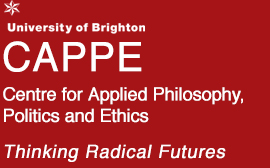CAPPE
Centre for Applied Philosophy, Politics & Ethics
Public Lecture
Social Movements & Radical Politics
Miriyam Aouragh | University of Westminster
Rethinking Digital Power: the Arab Uprisings Then and Now
14th May 2019 | 6.30pm - 8.00pm | G7 Pavilion Parade
ALL WELCOME
In 2010 and 2011 social struggles in a number of Arab states reached a tipping point as the accumulation of protest produced mass mobilisations against embedded regimes. Yet the media narrative rapidly moved from a framework of protest as self-emancipation in the “Arab Spring” to doom-laden scenarios in which ‘civil war’ and ISIS were emblematic of an “Arab Winter”. A focus on the internet reoccurs in many of these accounts, with the role of social media as a dominant framework. With the shift from local social struggle to wider geopolitics, attention to grassroots initiatives has faded and the voices of ordinary activists have been overwhelmed by the drums of war. A retrospective construction suggests that what was seen were not truly social uprisings or, at best, that the Arab Uprisings and the struggle for social justice is no more. This paper, focused on Syria and Morocco, seeks to clarify a paradox of the internet: on the one hand, its ability to widen and liberate the public sphere and on the other its potential to enable a shrunken and authoritarian public sphere. Secondly, the paper investigates the revolutionary tactics against counter-revolutionary strategies, to illustrate that activists adapt to the different features of digital media. Thirdly, the paper will argue that these attempts have to be understood through the prism of grassroots digital activism by virtue of other social and political factors. Finally, the paper demonstrates that the internet is not only a site of contestation, but also a site of retention. Through digital memory-making we see that activists’ engagement works to preserve their revolutionary aspirations and their stamina.
Miriyam Aouragh is Senior Lecturer at Communication And Media Research Institute at the University of Westminster, London. During her PhD (University of Amsterdam, NL) she studied the implications of the internet as it was first (Web 1.0) introduced in Palestine and in particular the significance of this techno-evolution coinciding with the outbreak of the Second Intifada. At the Oxford Internet Institute (UK) she focused on the political role of new internet developments, such as blogging and social networking (Web 2.0) for grassroots activism in Lebanon and Palestine. In her Leverhulme funded research project she continued combining ethnographic (offline) methodologies with critical theory and online analysis, focusing on the complex revolutionary dynamics in the Arab world, and its techno-social relations, she develops this into a critical study of the paradoxical context of revolution, counter-revolution and cyber imperialism. Her work is published in several books and journals including her own monograph Palestine Online (IB Tauris 2011) and forthcoming monograph about the evolutionary dynamics of protest in Morocco.
